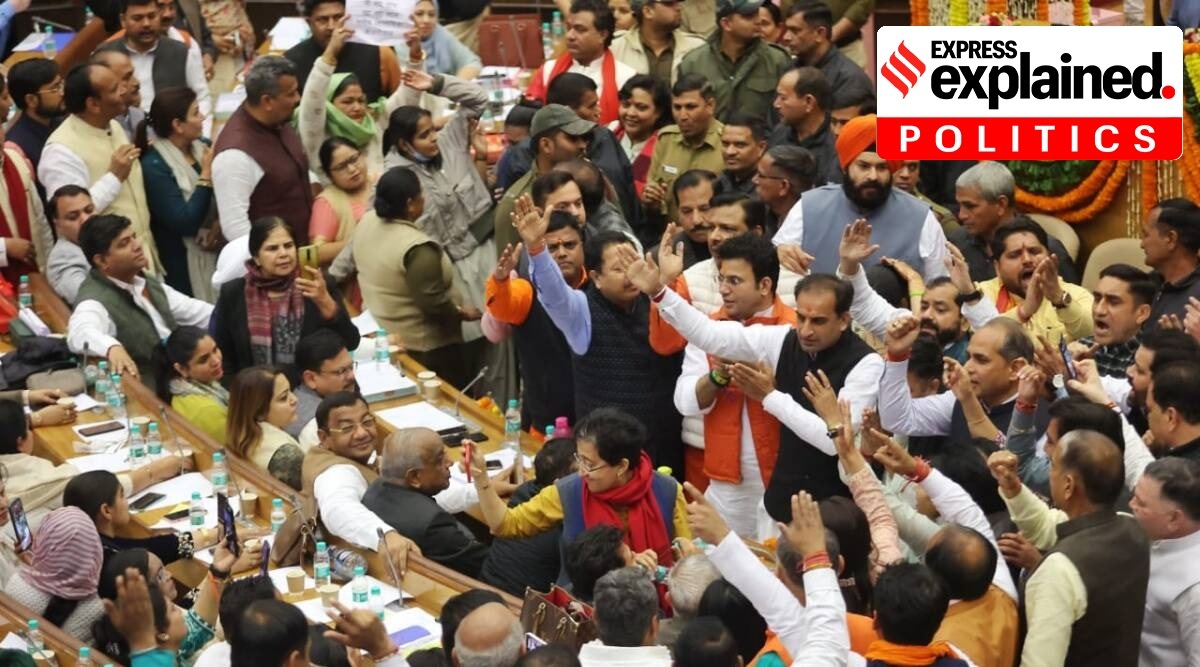Satya Sharma, the Presiding Officer for the mayoral election in the Municipal Corporation of Delhi (MCD), said on February 6 that aldermen — who are nominated members — are allowed to vote in the House and elect the Mayor, Deputy Mayor, and members of the Standing Committee as per the Delhi Municipal Corporation Act, 1957. The Supreme Court, on Friday, held that they cannot.
Sharma, a BJP councillor who was in January nominated as Presiding Officer by Lieutenant Governor Vinai Kumar Saxena, also proposed that voting for all three elections should be held simultaneously. The SC has now held that this cannot be the case and that the Mayor should be elected first who will then preside over the election of the deputy mayor and standing committee members. It has also directed that the notification for the election of the Mayor should be issued in 24 hours.

While protesting the swearing-in of aldermen ahead of elected councillors, the Aam Aadmi Party (AAP) had expressed the apprehension that this was being done to provide aldermen with voting rights, which they do not have under the Delhi Municipal Corporation Act, 1957. This apprehension had come true but has now been effectively struck down.
The House was adjourned on three successive occasions over varying issues related to nominated members, or the 10 aldermen who are members of the Bharatiya Janata Party (BJP), recommended by Lieutenant Governor Vinai Kumar Saxena.
The Mayor elections of the MCD were postponed on January 6, January 24 and February 6 following confrontations between AAP and BJP leaders triggered by issues ranging from the swearing-in of aldermen to voting rights for them.
Who are aldermen, and how are they selected?
Broadly, the term alderman refers to a member of a city council or municipal body; however, their specific roles and responsibilities differ according to the context.
Under the Delhi Municipal Corporation Act, the administrator can nominate 10 individuals over the age of 25 to the corporation. These aldermen are expected to have special knowledge or experience in municipal administration, and assist the House in taking decisions of public importance.
Story continues below this ad
In January, amid protests by the AAP, L-G Saxena appointed 10 aldermen to the MCD in his capacity as the administrator of Delhi. Four aldermen were sworn in on January 6, the day the newly-elected House was first convened. Another six were sworn in on January 23. All 10 are members of the BJP.
What does the law say about voting rights for nominated members?
Section 3(3)(b)(i) in Chapter II (Constitution of the Corporation) of the Delhi Municipal Corporation Act, 1957, says: “Ten persons, who are not less than 25 years of age and who have special knowledge or experience in municipal administration, to be nominated by the Administrator: Provided that the persons nominated under this sub-clause shall not have the right to vote in the meetings of the Corporation.”
Presiding Officer Sharma claimed in the House on Monday that an amendment to the DMC Act notified in May 2022 gave aldermen the right to vote.
This amendment reduced the number of wards in the MCD from 272 to 250 and replaced the word “government” in the Act with “Central government”. But it did not make changes in the voting powers of nominated members.
Story continues below this ad
Article 243R of the Constitution, which describes the “Composition of Municipalities”, says that “The Legislature of a State may, by law, provide…for the representation in a Municipality of…persons having special knowledge or experience in Municipal administration…Provided that the persons…shall not have the right to vote in the meetings of the Municipality.”
Does this mean aldermen have no voting rights at all?
Until 2015, aldermen had no voting rights in the House or Ward Committees (there is one from each of the 12 zones) of the MCD. On a challenge by alderman Onika Malhotra of the Congress, a single-judge Bench of Delhi High Court ruled that “the petitioners being constituent members of Ward Committees, can participate and vote in any meeting of the respective Wards Committee”.
However, the judgment said, they “cannot file their nomination or offer their candidature for being elected as Chairperson of the Wards Committee. The petitioners may also offer their candidature for being elected as member of the Standing Committee. In the event any of the petitioners are elected as member of the Standing Committee, they may vote at any meeting of the Standing Committee and also offer their candidature for being elected as Deputy Chairperson of the Standing Committee; but, they cannot offer their candidature for being appointed as a Chairperson of the Standing Committee.”
In 2016, a two-judge Bench upheld the order of the single judge.
Story continues below this ad
Can elections for Mayor, Deputy Mayor, and Standing Committee be held simultaneously, as directed by the Presiding Officer?
AAP leaders on Monday said there was no precedent for this. Deputy Chief Minister Manish Sisodia said the direction was illegal, and that the Mayoral election must be completed first.
The notification appointing Sharma as the Presiding Officer had stated: “The newly constituted corporation will proceed to elect the Mayor as required by section 35 of the Act. The Mayor so elected will then resume the chair and will proceed to conduct the election of the Deputy Mayor and six members of the Standing Committee as required under Section 35(1) and 45(1) (i) of the Act respectively.”
How is the MCD functioning without a Mayor or Standing Committee?
Following the 2022 amendment, the Centre can appoint a ‘Special Officer’ to “exercise the power and discharge the functions of the Corporation until the date on which the first meeting of the Corporation is held after the commencement of the Delhi Municipal Corporation (Amendment) Act, 2022”.
The Mayor, Deputy Mayor and six Standing Committee members are usually elected in the first meeting itself. The remaining 12 members of the Standing Committee are elected in subsequent meetings called by the Mayor. The three adjournments over the past month have meant that only the councillors and aldermen have been sworn in so far.
Story continues below this ad
The work of the corporation is being handled by the executive wing, which comprises the Special Officer, the Commissioner and other officers.
What happens now?
Members nominated to the House of the Municipal Corporation of Delhi (MCD) cannot vote to elect the mayor, deputy mayor or members of the standing committee, the Supreme Court has now held. The apex court also said that the Mayor should be elected first who will then preside over the election of the deputy mayor and standing committee members issuing further directions to the authorities concerned to ensure that the notification for the Mayoral election be issued in 24 hours. The court was hearing a plea requesting early conduct of internal polls to the civic body filed by AAP Mayoral candidate Shelly Oberoi.








































